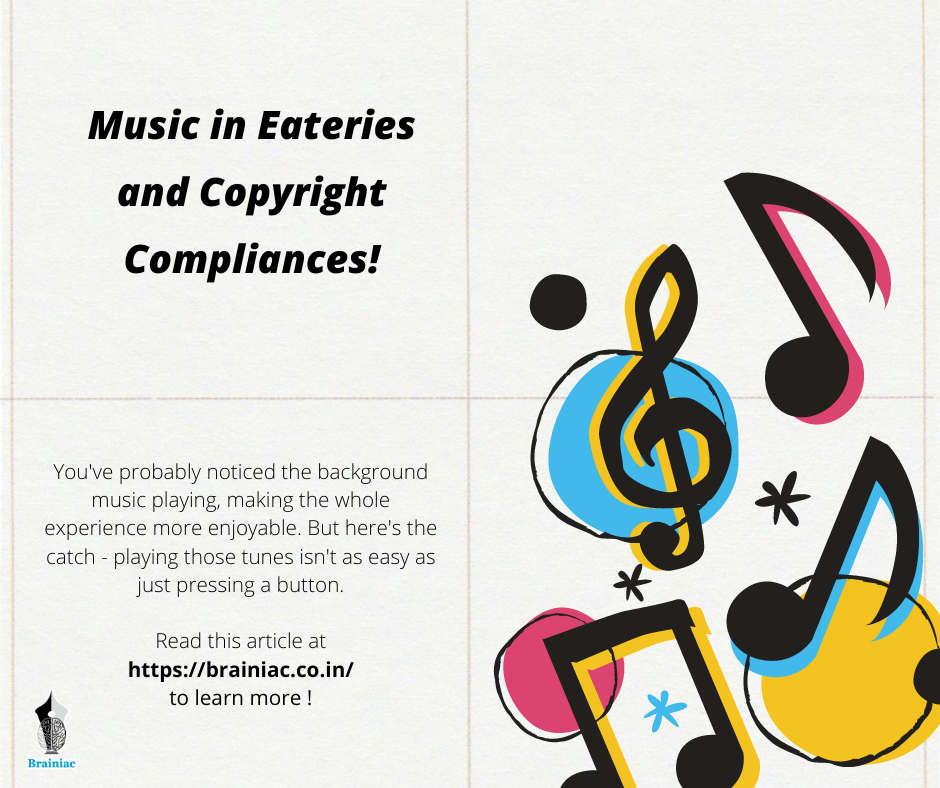Introduction
Imagine your favourite local restaurant or pub in India – the place where you enjoy good food and great vibes. You’ve probably noticed the background music playing, making the whole experience more enjoyable. But here’s the catch – playing those tunes isn’t as easy as just pressing a button. There are rules and permissions behind the scenes that these places need to follow to make sure everything’s legal. This article is here to break down those legal compliances, talking about the permissions these spots need, the process to get them, and how it all works for pubs and eateries in India.
Understanding Copyrighted Music
Before delving into the legalities, it’s crucial to understand what constitutes copyrighted music. In India, musical works are protected under the Copyright Act, 1957. This protection extends to both the musical composition (the melody and lyrics) and the sound recording (the actual recording of the music).
Permissions Required
When it comes to playing copyrighted music in public establishments like eateries, restaurants, and pubs, owners must secure two distinct licenses to ensure compliance with copyright laws. These licenses pertain to the musical composition and the sound recording, acknowledging the distinct aspects of creation involved.
Performance License for Musical Composition:
The Performance License for the musical composition is acquired from Performance Rights Organizations (PROs) such as the Indian Performing Right Society Limited (IPRS). Owners must engage with the IPRS to express their intention to play copyrighted musical compositions within their establishments. IPRS plays a pivotal role in the ecosystem by collecting and distributing royalties on behalf of composers and lyricists. When musical compositions are performed in public spaces like eateries, IPRS ensures that the rightful creators receive fair compensation for the use of their artistic works. The fees paid by establishments for the Performance License contribute to a pool of royalties, which IPRS then distributes to composers and lyricists based on the frequency and scale of public performances of their works.
Phonographic Performance License for Sound Recording:
The license for sound recordings is obtained from the Phonographic Performance Limited (PPL) in India. Establishments must engage with PPL to initiate the licensing process for playing copyrighted sound recordings. PPL represents the interests of record labels and recording artists, acting as a collective management organization. It ensures that record labels and artists receive fair compensation when their sound recordings are played in public spaces. Similar to IPRS, PPL collects licensing fees from establishments, which then contribute to the pool of royalties. These royalties are distributed among record labels and recording artists based on the usage of their sound recordings in public performances.
The Licensing Process
Contacting PROs and PPL: In the initial step of the licensing process, establishments are required to reach out to Performance Rights Organizations (PROs) such as the Indian Performing Right Society Limited (IPRS) and the Phonographic Performance Limited (PPL). This communication is essential for expressing the establishment’s intent to play copyrighted music within its premises.
Application and Documentation: Once the establishment has gathered the necessary information from IPRS and PPL, the next step involves submitting a formal application. This application typically includes a detailed form, which may request the following information:
Venue Details: Comprehensive information about the establishment, including its name, address, and capacity.
Music Program Details: Specifications on the type of music that will be played, the genres, and any specific artists or compositions that are anticipated to be featured.
Performance Frequency: An outline of how frequently live performances or playback of copyrighted music is expected to occur within the establishment.
Payment of Licensing Fees: Upon the approval of the application, establishments are obligated to pay the determined licensing fees. These fees contribute to the compensation of artists and copyright holders for the use of their intellectual property within the establishment.
Display of License: Once the licensing fees have been settled, establishments receive a formal license certificate from the PROs and PPL. This certificate serves as official documentation that the establishment has obtained the necessary permissions to play copyrighted music.
Legal Implications for Non-compliance
Failure to comply with copyright regulations in eateries, restaurants, and pubs can lead to severe legal consequences. Playing copyrighted music without the required licenses may result in copyright infringement lawsuits, with artists, composers, and record labels seeking damages and compensation. Non-compliance could also lead to the imposition of fines and penalties by the courts. In extreme cases, establishments may face closure orders, reputational damage, and a loss of business. The legal implications underscore the necessity for businesses to prioritize compliance, not only to abide by the law but also to contribute to a fair compensation system for the creative individuals behind the music. Obtaining the appropriate licenses is not just a legal obligation; it’s a crucial step in maintaining a positive and lawful environment for both establishments and the music industry.
Conclusion
In conclusion, the inclusion of copyrighted music in Indian eateries and pubs requires meticulous adherence to copyright laws. By obtaining the necessary licenses from IPRS and PPL, establishments not only ensure compliance but also contribute to the fair compensation of the artists who enrich our dining and social experiences with their musical creations. As the culinary and entertainment landscape continues to evolve, a harmonious blend of legal compliance and artistic expression is key to creating a vibrant and lawful atmosphere in our favourite establishments.


